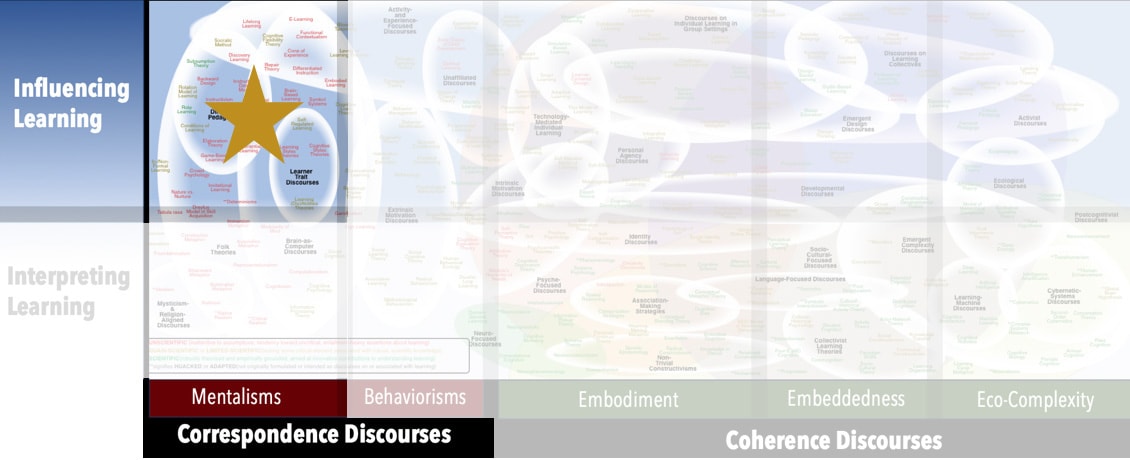AKA
Elenctic Method
Maieutics
Method of Elenchus
Focus
Interrogating and honing claims to truth through social encountersPrincipal Metaphors
- Knowledge is … range of established/enacted beliefs
- Knowing is … awareness of beliefs
- Learner is … an interlocutor
- Learning is … analyzing bases of and honing beliefs
- Teaching is … maieutics (i.e., midwifery, named for the emphasis on drawing out deep-seated assumptions)
Originated
400s BCESynopsis
The Socratic Method is a form of dialogue/argument in which one participant asks strategic questions in an attempt to draw out the other’s assumptions and ideas – hoping to reveal inconsistencies, gaps, and/or contradictions in support of more critical understandings. (See Socratic Questions, under Questions.) Some describe the Socratic Method as a strategy to eliminate hypotheses through systematic analysis and logical refutation of untenable beliefs. For the most part, the method was originally applied to abstract concepts, such as morals and virtues. The Socratic Method is often associated with:- Aporia – a Greek word having to do with puzzlement, being perplexed, at an impasse, or raising doubts, in the context of teaching, Aporia typically refers to modes of engagement that prompt the learner to question assumptions and conclusions
- Psychagogy – Greek for “soul guidance,” the original meaning of Psychagogy had to do with influencing one’s soul by using rhetoric to help draw new realities from within. Currently, the broad meaning of Psychagogy has to do with influencing one’s imagined horizon of possibilities by helping to explore desirable life goals.
The Socratic Method reaches us through the writings of his student, Plato, whose student Aristotle articulated “Three Methods/Modes of Persuasion” that come commentators associate with the Socratic Method:
- Ethos (Aristotle, c. 350 BCE) – persuasiveness that can be attributed to the audience’s perceptions of the informant’s character (i.e., credibility, warmth, etc.)
- Pathos (Aristotle, c. 350 BCE) – persuasiveness associated with the extent to which the audience is aroused (emotionally) to belief or action
- Logos (Aristotle, c. 350 BCE) – persuasiveness that is rooted in reasoned argument (i.e., explicit definitions, analogies, and/or logic)
- Analytic Learning (Analytical Learning) – a teaching emphasis that begins with analyzing the components and the structure of the concepts with a view toward blending learners’ prior knowledge with new realizations to make rational generalizations
- Socratic Effect (William McGuire, 1970s) – the phenomenon by which explicit articulation of personal beliefs tends to prompt enhanced coherence among one’s broad system of beliefs
Commentary
The Socratic Method is suited to a very limited range of topics and settings, requiring time and teaching resources that make it ill-fitted as a principal classroom emphasis. As well, some assert that the Socratic Method was originally based on a widely-rejected assumption of Nativism, and so the approach was intended to help on draw out knowledge that was assumed to be already present in one’s being.Authors and/or Prominent Influences
Socrates; PlatoStatus as a Theory of Learning
The Socratic Method is often discussed as though it were a theory of learning – and, in some ways, that’s appropriate. The perspective explicitly asserts some principles of learning, most obviously the belief that higher-order, abstract learning and thinking involve critical analyses of underlying assumptions and common sense.Status as a Theory of Teaching
The Socratic Method is a theory of teaching, and one that many educators have worked to adapt to large-group settings. Many variations currently exist, including “fishbowl” (in which the majority of students are arranged in an outer circle observing a dialogue unfold in an inner circle) and strategies based on small-group formats.Status as a Scientific Theory
The Socratic Method has been empirically researched, and there are claims that it both supports critical thinking, creativity, and more robust understandings of complex issues. However, its conflicted theoretical grounding means it does not meet all of our criteria.Subdiscourses:
- Analytic Learning (Analytical Learning)
- Aporia
- Ethos
- Logos
- Pathos
- Psychagogy
- Socratic Effect
Map Location

Please cite this article as:
Davis, B., & Francis, K. (2025). “Socratic Method” in Discourses on Learning in Education. https://learningdiscourses.com.
⇦ Back to Map
⇦ Back to List
